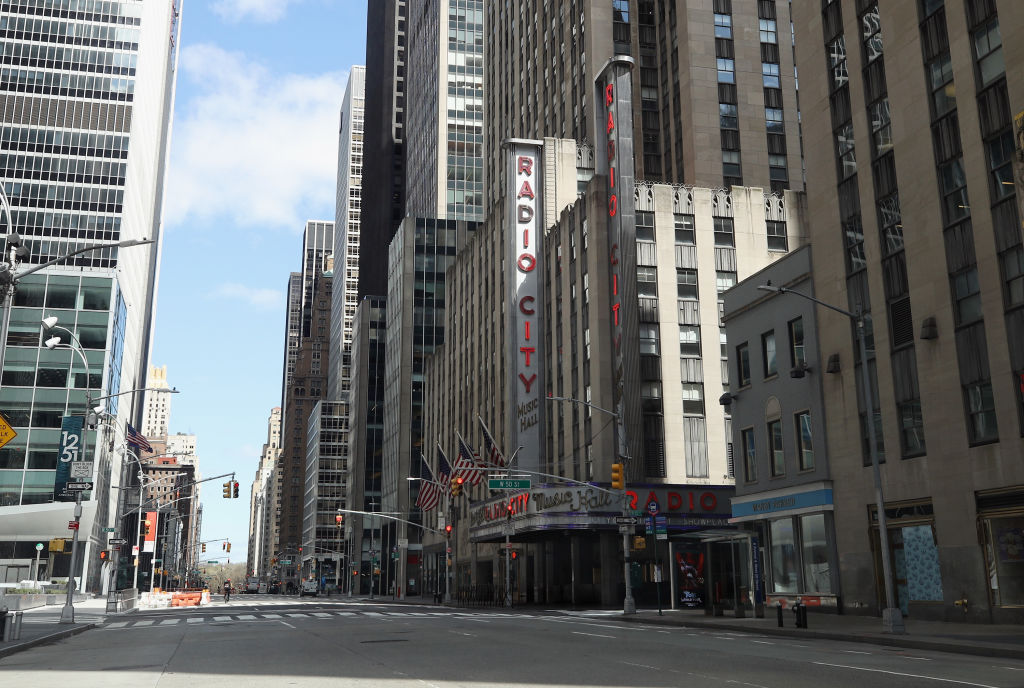U.S. output decline over last 3 weeks akin to Indiana disappearing for a year, economist says


A free daily email with the biggest news stories of the day – and the best features from TheWeek.com
You are now subscribed
Your newsletter sign-up was successful
Economic-analysis firm Moody's Analytics took a look at every county in the United States to estimate how the novel COVID-19 coronavirus pandemic has affected economic output. The results weren't pretty.
Government-ordered shutdowns of non-essential businesses have led to daily output declines in most counties, whether it be large ones like Los Angeles County or smaller ones in rural areas. Overall, the firm estimates the nation's daily output is down 29 percent from the first week of March before most businesses closed. In terms of dollars, that's $350 billion, which is reportedly more than triple the size of the decline in the weeks following the Sept. 11, 2001 terrorist attacks. Mark Zandi, Moody's chief economist, said the drop-off is akin to Indiana disappearing for an entire year.
"This is a natural disaster," said Zandi. "There's nothing in the Great Depression analogous to what we're experiencing now."
The Week
Escape your echo chamber. Get the facts behind the news, plus analysis from multiple perspectives.

Sign up for The Week's Free Newsletters
From our morning news briefing to a weekly Good News Newsletter, get the best of The Week delivered directly to your inbox.
From our morning news briefing to a weekly Good News Newsletter, get the best of The Week delivered directly to your inbox.
If things continue on the same path, there would be a 75-percent decline in the second quarter, but Zandi is mostly aligned with other analysts who think business will eventually pick back up, preventing such a disastrous fate from coming to fruition. Still, The Wall Street Journal notes, Moody's likely underestimates the total hit of the shutdown because it only focuses on business closures and didn't account for a drop in demand resulting from increased unemployment and the pending loss of household wealth. Read more at The Wall Street Journal.
A free daily email with the biggest news stories of the day – and the best features from TheWeek.com
Tim is a staff writer at The Week and has contributed to Bedford and Bowery and The New York Transatlantic. He is a graduate of Occidental College and NYU's journalism school. Tim enjoys writing about baseball, Europe, and extinct megafauna. He lives in New York City.
-
 6 of the world’s most accessible destinations
6 of the world’s most accessible destinationsThe Week Recommends Experience all of Berlin, Singapore and Sydney
-
 How the FCC’s ‘equal time’ rule works
How the FCC’s ‘equal time’ rule worksIn the Spotlight The law is at the heart of the Colbert-CBS conflict
-
 What is the endgame in the DHS shutdown?
What is the endgame in the DHS shutdown?Today’s Big Question Democrats want to rein in ICE’s immigration crackdown
-
 TikTok secures deal to remain in US
TikTok secures deal to remain in USSpeed Read ByteDance will form a US version of the popular video-sharing platform
-
 Unemployment rate ticks up amid fall job losses
Unemployment rate ticks up amid fall job lossesSpeed Read Data released by the Commerce Department indicates ‘one of the weakest American labor markets in years’
-
 US mints final penny after 232-year run
US mints final penny after 232-year runSpeed Read Production of the one-cent coin has ended
-
 Warner Bros. explores sale amid Paramount bids
Warner Bros. explores sale amid Paramount bidsSpeed Read The media giant, home to HBO and DC Studios, has received interest from multiple buying parties
-
 Gold tops $4K per ounce, signaling financial unease
Gold tops $4K per ounce, signaling financial uneaseSpeed Read Investors are worried about President Donald Trump’s trade war
-
 Electronic Arts to go private in record $55B deal
Electronic Arts to go private in record $55B dealspeed read The video game giant is behind ‘The Sims’ and ‘Madden NFL’
-
 New York court tosses Trump's $500M fraud fine
New York court tosses Trump's $500M fraud fineSpeed Read A divided appeals court threw out a hefty penalty against President Trump for fraudulently inflating his wealth
-
 Trump said to seek government stake in Intel
Trump said to seek government stake in IntelSpeed Read The president and Intel CEO Lip-Bu Tan reportedly discussed the proposal at a recent meeting
